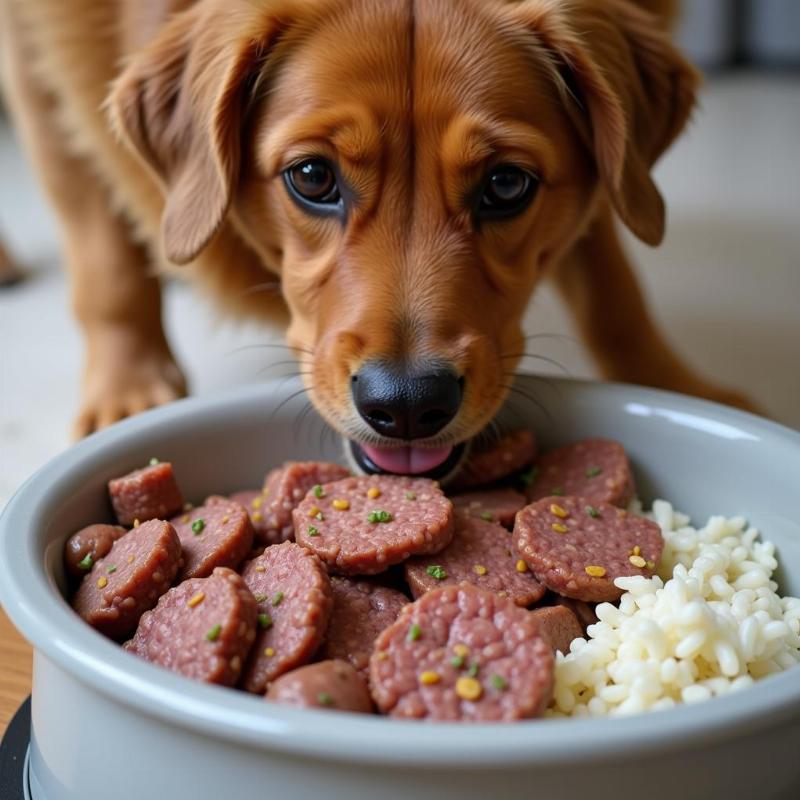Hamburger and rice is a common homemade meal for dogs, often touted for its simplicity and perceived health benefits. But is this combination truly nutritious for our canine companions, or does it pose hidden risks? This article dives deep into the nutritional value of hamburger and rice for dogs, exploring its pros, cons, and best practices for safe and balanced feeding.
Is Hamburger and Rice Good for Dogs?
While the simplicity of hamburger and rice can be appealing, it’s important to understand that it doesn’t offer complete nutrition for dogs. Beef provides protein, and rice offers carbohydrates, but a canine diet requires a broader spectrum of nutrients, including essential vitamins, minerals, and fatty acids, for optimal health. Feeding hamburger and rice exclusively can lead to nutritional deficiencies over time. However, in certain situations, like upset stomachs, a bland diet of hamburger and rice can be beneficial under the guidance of a veterinarian.
 Dog enjoying hamburger and rice
Dog enjoying hamburger and rice
The Nutritional Breakdown of Hamburger and Rice
Ground beef is a good source of protein, essential for muscle development and repair in dogs. It also contains iron and some B vitamins. However, the fat content in hamburger can vary greatly, and excessive fat intake can lead to pancreatitis and obesity. White rice is easily digestible and provides a source of carbohydrates for energy. Brown rice is a healthier option, offering more fiber and nutrients than white rice.
Potential Risks of Feeding Hamburger and Rice to Dogs
Feeding a diet solely consisting of hamburger and rice can lead to several health issues. These include:
- Nutritional Deficiencies: This diet lacks essential vitamins and minerals, potentially causing health problems in the long run.
- Pancreatitis: High fat content in hamburger can trigger pancreatitis, a serious and potentially life-threatening inflammation of the pancreas.
- Obesity: Excessive calorie intake from fatty hamburger and carbohydrates in rice can lead to weight gain and associated health problems.
- Imbalance in Calcium and Phosphorus: An improper ratio of these minerals can negatively impact bone development, especially in puppies.
How to Safely Prepare Hamburger and Rice for Your Dog
If you choose to feed your dog hamburger and rice, it’s crucial to do so safely and responsibly:
- Choose lean ground beef: Opt for ground beef with the lowest fat content possible to minimize the risk of pancreatitis and obesity.
- Cook the hamburger thoroughly: Ensure the meat is cooked to an internal temperature of 165°F (74°C) to kill harmful bacteria.
- Use plain, cooked rice: Avoid adding seasonings, salt, or butter, which can be harmful to dogs.
- Introduce gradually: If your dog is not accustomed to hamburger and rice, introduce it slowly to avoid digestive upset.
- Consult your veterinarian: Before making any significant dietary changes, consult your veterinarian to ensure it’s appropriate for your dog’s individual needs.
Balancing Hamburger and Rice with Other Nutrients
Hamburger and rice should never be the sole component of a dog’s diet. To ensure complete nutrition, consider adding other healthy ingredients, such as:
- Vegetables: Cooked carrots, green beans, and sweet potatoes offer essential vitamins and fiber.
- Fruits: Apples (without seeds or core), blueberries, and bananas provide antioxidants and vitamins.
- Dog-safe Supplements: Consult with your veterinarian to determine if your dog requires any specific supplements to meet their nutritional needs.
When Hamburger and Rice Can Be Beneficial
Under certain circumstances, a bland diet of hamburger and rice can be helpful for dogs experiencing digestive issues like diarrhea. It’s easily digestible and can help soothe the stomach. However, this should be a temporary solution, and you should always consult your veterinarian before using it as a treatment for digestive problems. They can determine the underlying cause and recommend the best course of action.
Conclusion
While hamburger and rice can be a palatable meal for dogs, it’s vital to remember that it doesn’t provide complete nutrition. Feeding it exclusively can lead to nutritional deficiencies and health problems. If you choose to feed your dog this combination, make sure to use lean ground beef, cook it thoroughly, and supplement it with other nutritious ingredients. Always consult your veterinarian before making any significant dietary changes to ensure your furry friend receives the balanced nutrition they need to thrive.
FAQ
- Can I feed my dog hamburger and rice every day? No, it’s not recommended to feed hamburger and rice every day as it lacks essential nutrients.
- Is brown rice better than white rice for dogs? Yes, brown rice is generally better as it’s higher in fiber and nutrients.
- What should I do if my dog gets diarrhea after eating hamburger and rice? Consult your veterinarian. They can determine the cause and recommend the appropriate treatment.
- Can puppies eat hamburger and rice? Yes, but it shouldn’t be their primary food source due to the lack of complete nutrition.
- What are some healthy alternatives to hamburger and rice? Commercially prepared dog food formulated to meet AAFCO standards is the best option.
Beautdogs.us is your one-stop resource for all things dog-related. We provide expert advice on dog breeds, care, and products, catering to both novice and experienced dog owners. We are committed to providing reliable and comprehensive information to help you provide the best possible care for your canine companion. Contact us for all your dog-related inquiries! Email: [email protected], Phone: +1 501-555-7529. Learn more about us and explore a wealth of information on Beautdogs.us.